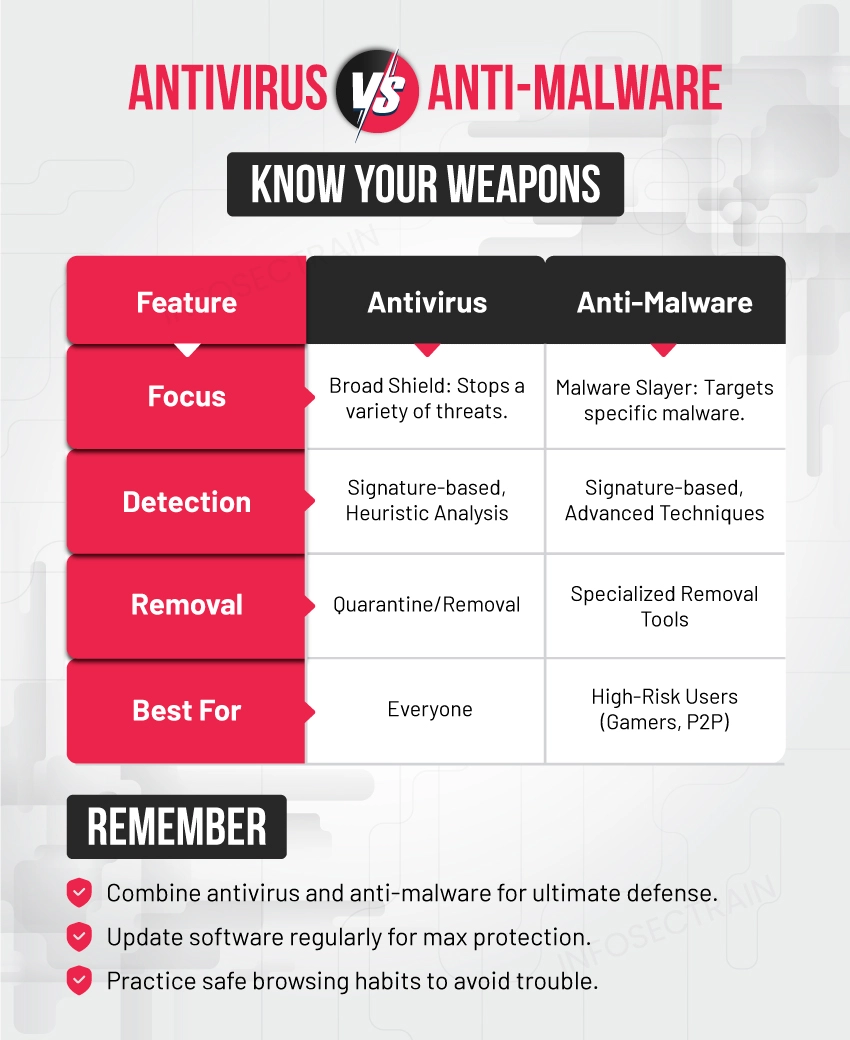Antivirus vs. Anti-Malware
The digital age offers incredible opportunities but also exposes us to a constant stream of cyber threats. Protecting your devices and data requires a multi-layered approach. Two critical elements of your digital security toolkit are antivirus software and anti-malware tools. While both are crucial for online safety, they tackle threats in specific ways. In this blog post, we explain the difference between antivirus and anti-malware, making it easy for you to choose the best option for protecting your computer.

Antivirus Software:
Antivirus software acts as a comprehensive security suite, offering a multi-layered defense against a broad spectrum of cyber threats. Here’s a breakdown of its core functionalities:
- Virus Detection and Removal: The primary function of antivirus software is to identify and eliminate malicious software, commonly known as viruses. It achieves this by maintaining a continuously updated database of known virus signatures – unique patterns of code used to identify specific threats. When a scan detects a match against a virus signature in the database, the antivirus software quarantines or removes the infected file to prevent further harm.
- Real-Time Protection: Modern antivirus software provides real-time protection, continuously monitoring system activity for suspicious behavior. This includes scanning files upon download or execution, monitoring network traffic for malicious activity, and even inspecting email attachments for potential threats.
- Heuristic Analysis: Beyond signature-based detection, some antivirus programs utilize heuristic analysis. This approach involves analyzing a file’s behavior and characteristics to identify potential threats even if they haven’t been encountered before. However, heuristic analysis can lead to false positives, where a benign file is flagged as malicious.
- Firewall Integration: Many antivirus programs incorporate firewall functionality, acting as a barrier between your device and the external network. The firewall controls incoming and outgoing traffic, blocking unauthorized access and potentially harmful connections.
Additional Features: Depending on the software suite, antivirus programs may offer additional features like:
- Phishing Protection: Identifying and blocking fraudulent websites designed to steal personal information.
- Spam Filtering: Filtering out unwanted and potentially malicious emails.
- Vulnerability Scanning: Identifying security weaknesses in your operating system and applications to prioritize patching.
Anti-Malware Tools:
Anti-malware software specifically targets a particular type of cyber threat – malware. Malware encompasses a broader category that includes viruses, worms, Trojan horses, spyware, and ransomware. While antivirus software provides some protection against these threats, dedicated anti-malware tools often offer more advanced detection and removal capabilities for specific malware types. Here’s what sets them apart:
- Specialized Detection Techniques: Anti-malware software may employ advanced detection techniques beyond signature-based approaches. This can involve behavioral analysis, which monitors a program’s actions for suspicious activities, and sandboxing, where a suspected file is run in a simulated environment to observe its behavior without risking system infection.
- Targeted Removal Tools: Anti-malware programs might have specialized tools for removing deeply entrenched malware that traditional antivirus software may struggle with. Rootkit detection and removal functionalities are often found in advanced anti-malware solutions.
- Focus on Emerging Threats: Anti-malware developers often place a significant emphasis on staying ahead of the curve by constantly updating their detection methods to identify and combat new and emerging malware threats.
Antivirus vs Anti-malware: A Detailed Comparison
| Feature | Antivirus Software | Anti-Malware Software |
| Primary Focus | Broad spectrum of cyber threats | Malware (viruses, worms, etc.) |
| Detection Methods | Signature-based, Heuristic Analysis | Signature-based, Heuristic Analysis, Behavioral Analysis, Sandboxing |
| Removal Techniques | Quarantining, Removal | Specialized removal tools |
| Additional Features | Firewall, Phishing Protection, Vulnerability Scanning (may vary) | Limited additional features |
| Target Audience | General users | Users at higher risk (gamers, P2P users) |

Making the Right Choice
While both antivirus and anti-malware software offer essential protection, the ideal security strategy often involves a layered approach that utilizes both. Here’s how they complement each other:
- Antivirus as a Foundation: Antivirus software provides a broader defense against various cyber threats, acting as the first line of defense. Its real-time protection, firewall integration, and phishing protection features offer a comprehensive shield against common attacks.
- Anti-Malware for Targeted Defense: Anti-malware software adds another layer of security by specializing in the detection and removal of sophisticated malware threats. Users who engage in activities that place them at higher risk, such as online gaming or peer-to-peer (file sharing), might benefit from the additional protection offered by dedicated anti-malware tools.
Understanding the distinct roles of antivirus software and anti-malware empowers you to build a robust digital defense. Consider employing both solutions in conjunction with safe browsing practices, software updates, strong passwords, and regular data backups. Remember, cybersecurity is an ongoing process.
How can InfosecTrain Help?:
At InfosecTrain, we understand the importance of staying vigilant in today’s ever-evolving digital landscape. Our comprehensive cybersecurity training courses empower individuals and organizations with the necessary skills important to navigate the online world safely and confidently. Explore our course offerings today and take control of your digital security!






 1800-843-7890 (India)
1800-843-7890 (India)